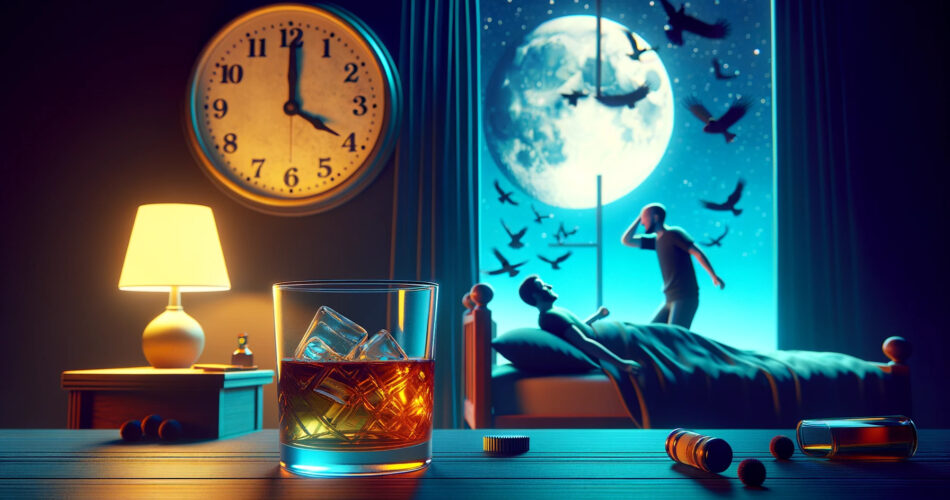Ever wondered if that evening glass of wine is lulling you into the land of nod or secretly plotting a night of disrupted dreams? Here’s the deal: alcohol might seem like your cozy bedtime buddy, but it’s really more of a frenemy to your precious slumber. Yes, it can fast-track the onset of sleep, but it’s a bit of a double-crosser once you’re out.
The Bedtime Brew Breakdown: How Alcohol Affects Sleep?
Let’s take a closer look at how your nightcap is conspiring against you after you’ve drifted off. Alcohol is a wolf in sheep’s clothing and it causes you to fall asleep faster, but as your body metabolizes that cheeky tipple, it reduces REM sleep (that’s the dreamy part of your sleep cycle). Spoiler alert: REM is crucial for feeling refreshed in the morning. Plus, as the night marches on, alcohol withdrawal symptoms kick in, triggering fragmented sleep and frequent awakenings. Not so dreamy, huh?
Debunking Boozy Bedtime Myths
Many folks believe a little libation before bedtime is the ticket to dreamland. Sure, alcohol is a sedative, but it’s about as reliable as a snooze button on a Monday morning. While you might doze off quicker, the second half of your sleep cycle often takes a hit, leaving you feeling like you’ve had a workout with your sheets rather than a restful night.
The Science of Sleepy Spirits
Digging a bit deeper, scientific studies have illustrated the contrary relationship between booze and snooze. Graphs and charts tracking sleep patterns show a clear disturbance in sleep architecture after alcohol consumption. So, while a drink can sedate you into sleepiness, it’s also adept at disrupting the very structure of your sleep!
Visualizing Vodka’s Vexing Effects
Imagine a chart plotting your sleep quality. Picture the line graph taking a nosedive every time alcohol enters the scene. That’s a simplified snapshot of the tumult alcohol inflicts on your zzz’s. Or envision a bar chart comparing sleep quality with alcohol, the bars are jagged, illustrating the fitful nature of your rest.
From Graphs to The Grapes of Wrath
Wine lovers, brace yourselves for some less-than-savory news. While red wine comes with a parade of health benefits, when it comes to sleep, the parade turns into a bit of a funeral march. The polyphenols can be kind to your heart, but the alcohol content isn’t as friendly to your REM cycles. Complex charts correlating alcohol types and sleep stages would reveal that all alcohol types are party poopers when it comes to maintaining quality sleep.

Alcohol and Sleep: A Complex Cocktail
So, should you ditch the nightcap altogether? Well, that’s a personal decision, but understanding the intricate dance between alcohol and sleep can help guide your choices. Perhaps limiting alcohol intake, especially close to bedtime, would be a wise move in your quest for uninterrupted dreamtime.
Stirring Up a Better Sleep Recipe
Your best bet is a blend of good sleep hygiene, maybe a splash of soothing tea, and ensuring your sleep environment is conducive to a solid night’s rest. By doing so, you’re more likely to wake up feeling like you’ve actually been asleep rather than attending an all-night rager.
Mix Alcohol With Caution
While alcohol may initially seem like a cozy blanket for your brain, it’s actually more akin to a blanket full of thorns. Sure, the sedative effects are undeniable but the disruptive aftermath is equally indisputable. For those of you seeking scholarly satisfaction, don’t be fooled by alcohol’s somnolent facade; the data points to a restless rendezvous with your pillow.
So, the next time you reach for that glass of shuteye stout or nocturnal nip, remember the complex relationship between alcohol and sleep. It might just be the incentive you need to skip the sip and opt for a more serene slumber strategy.
Key Takeaways:
- Evening alcoholic drinks may help you fall asleep faster but disrupt the quality of sleep.
- Consuming alcohol before bed reduces REM sleep, which is essential for feeling rested.
- Alcohol withdrawal symptoms during the night can lead to fragmented sleep and frequent awakenings.
- Scientific studies show a clear disturbance in sleep patterns following alcohol consumption.
- Graphs of sleep quality often show a decline when alcohol is involved, indicating disrupted rest.
- While red wine has health benefits, its alcohol content negatively affects REM sleep cycles.
- Limited alcohol intake, especially before bedtime, could improve sleep quality.
- Good sleep hygiene and a suitable sleep environment are recommended for better rest.
- Alcohol’s sedative effects are short-lived and followed by sleep disturbances.
- Choosing alternative relaxation methods before bed may lead to more peaceful sleep.


Comments